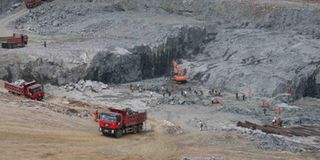Why few Ugandan engineers work on big projects

Workers excavate parts of the Isimba HPP site. Photo by Paul Tajuba.
Chinese occupy 100 per cent of the managerial and 76 per cent of the engineering posts at the Karuma Hydro Power Project.
Also, 75 per cent of foreman, 74 per cent of the geologist and 59 per cent of the site manager positions go to the Chinese.
On the other hand, Ugandans take up 100 per cent of the casual jobs and 80 per cent of the machine operator positions.
The same situation prevails at Isimba HPP where out of the 906 workers, 584 are Ugandans but 72 per cent of them do manual work.
Different players in the electricity sector say this does not portend well for Uganda’s human capital development since it gives no chance to local engineers to hone their skills on large renewable energy projects.
What explains the employment of few Ugandans on large electricity projects yet the country keeps producing engineers?
What to bear in mind
One has to bear in mind that both Karuma and Isimba are largely Chinese–funded projects.
One of the provisions of the contracts on the projects was that more Ugandans should understudy the Chinese in order to polish their skills.
To a large extent, the Chinese, like the Japanese, work not simply for the salary but for performance and efficiency.
They will slog away from as early as 6am to 6pm – with a two–hour lunch break in between – to meet a deadline.
According to Song Yijun, Sinohydro the Karuma project manager, “Many Ugandan engineers do not like working in the countryside. They want to stay in the city to enjoy life.
“Even fresh graduates from Makerere [University] we offer employment opportunities do not want to come to work here in Karuma.” Karuma is only 270 kilometres north of Kampala.
Additionally, Song says, construction companies offer short–term contracts (often not more than five years) yet many workers would want job security.
Working in the countryside
However, Christo Omara Balamoyi, a senior civil engineer at Karuma disagrees with Song as, “Engineers are field people,” and he offers himself as a Ugandan example enjoying work in the countryside.
He says while still at university, many come to learn that many construction projects are implemented out of cities.
But he acknowledges that the Chinese talk less and work more, unlike many locals and some workers from Europe.
However, there have been challenges of pay and welfare, which a government official who spoke on condition of anonymity, says: “It might be an issue of welfare”.
A report titled, Realising Potential 2014 Sub–Saharan Africa Talent Trends and Practices Survey, says competitive pay helps to attract employees.
Important factors
But it notes, “…factors relating to workplace environment (learning and development opportunities and the quality of management) are viewed amongst the most important factors for retaining staff.
Others put it on low quality staff. However, Stephen Robert Isabalija, the chairman of Uganda Electricity Generation Company Limited and the numbers involved disqualify the argument.
According to the Engineers Registration Board, Uganda has 772 registered engineers though only 494 are in practice. It is not clear why the remaining 278 do not practice.
Every year, Uganda’s tertiary institutions pass out hundreds of engineering students, thus mitigating brain drain – were it to be the reason there are fewer Ugandan professional engineers working in Uganda.
To address the problem of having fewer Ugandan professionals employed, government needs to enforce policies that demand use of more local labour where there are abundant skills.
This will make it harder for foreign companies to employ foreigners, especially if local talent is available.
This is important since a report by Ernst & Young projects that one-third of both local and multinational organisations expect to recruit more expatriate managers, professionals, and technical workers.
Government also needs to stop relying on work permits to check the problem since many work without them.
It is also important for companies to reconsider welfare payment as they seek to encourage professionals to work in rural areas.
Improving brands
Even better, companies have to work hard to improve their brand.
“The strength of the brand,” the 2014 report says, “remains the most important factor for attracting talent.”
Companies have to offer competitive salaries, learning opportunities and job security to attract professionals.
Many engineering, procurement and construction contractors have to build social amenities, which house commercial banks, restaurants and even hotels as well as sports centres.
To that effect, Sinohydro Corporation Uganda Limited, the company constructing Karuma HPP, is building a commercial building and a market in Karuma.
The 600 megawatt Karuma HPP is one of the many large hydropower projects government has embarked on to stave off load shedding in the medium term.
Once complete, Ayago (600MW) and Oraba will be constructed but many think and demand that the remaining plants involve more Ugandan engineers and other technical staff, even if the money for financing such projects is borrowed.
Alternative view
According to Stephen Robert Isabalija, Uganda is building more dams, which means that Ugandans will be more involved.
This, he says, will help Ugandans get the required knowledge as the country looks to implement future projects. Isabalija says people should work to get more knowledge as government continues to invest the $1.7b (Shs6.2 trillion) which it borrowed from China.
According to Isabalija, part of the borrowed money will be used to boost local skills capacity.




